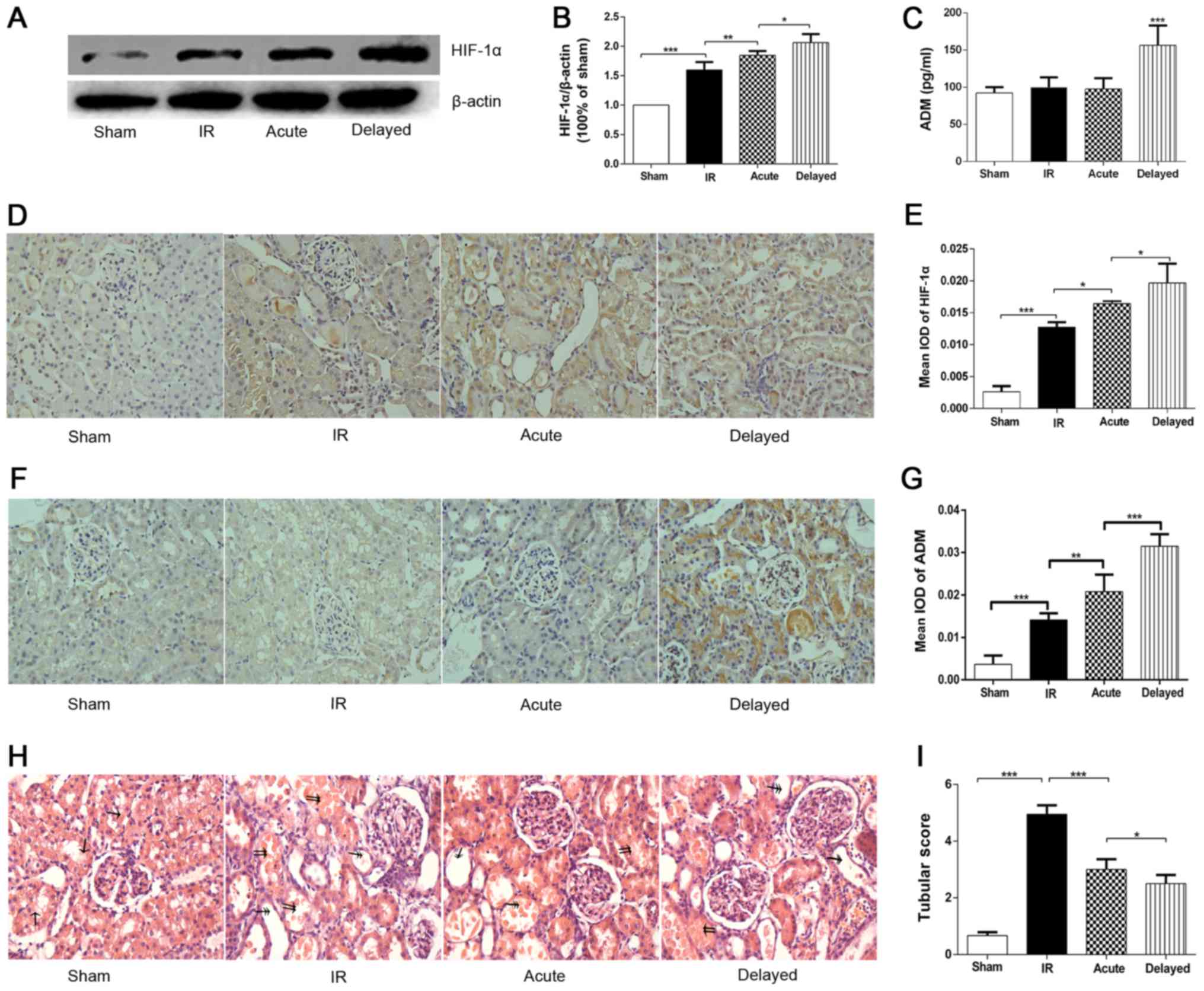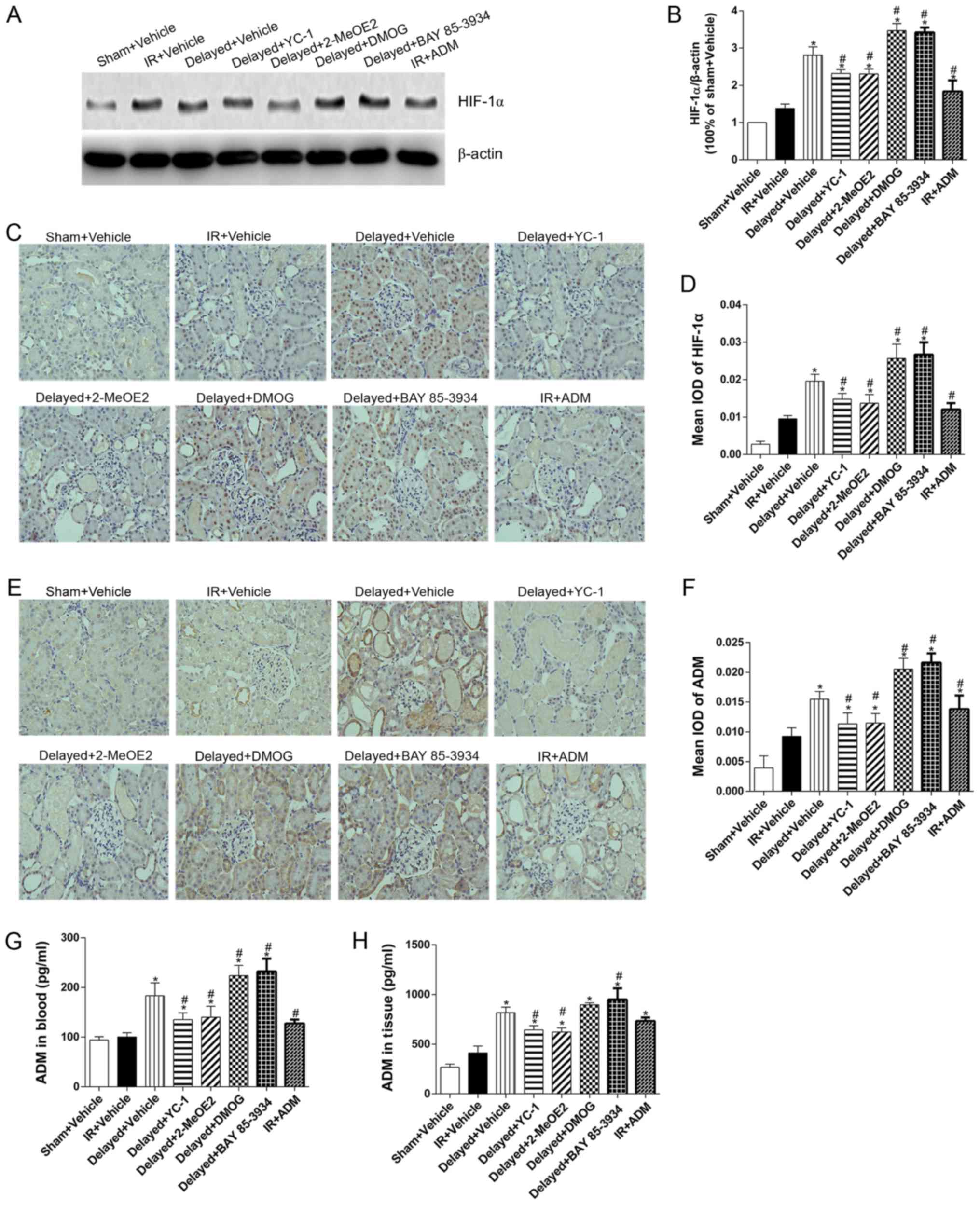|
1
|
Murry CE, Jennings RB and Reimer KA:
Preconditioning with ischemia: A delay of lethal cell injury in
ischemic myocardium. Circulation. 74:1124–1136. 1986. View Article : Google Scholar : PubMed/NCBI
|
|
2
|
Przyklenk K, Bauer B, Ovize M, Kloner RA
and Whittaker P: Regional ischemic ‘preconditioning’ protects
remote virgin myocardium from subsequent sustained coronary
occlusion. Circulation. 87:893–899. 1993. View Article : Google Scholar : PubMed/NCBI
|
|
3
|
Tapuria N, Kumar Y, Habib MM, Abu Amara M,
Seifalian AM and Davidson BR: Remote ischemic preconditioning: A
novel protective method from ischemia reperfusion injury-a review.
J Surg Res. 150:304–330. 2008. View Article : Google Scholar : PubMed/NCBI
|
|
4
|
Wever KE, Warlé MC, Wagener FA, van der
Hoorn JW, Masereeuw R, van der Vliet JA and Rongen GA: Remote
ischaemic preconditioning by brief hind limb ischaemia protects
against renal ischaemia-reperfusion injury: The role of adenosine.
Nephrol Dial Transplant. 26:3108–3117. 2011. View Article : Google Scholar : PubMed/NCBI
|
|
5
|
Remote Preconditioning Trialists' Group, ;
Healy DA, Khan WA, Wong CS, Moloney MC, Grace PA, Coffey JC, Dunne
C, Walsh SR, Sadat U, et al: Remote preconditioning and major
clinical complications following adult cardiovascular surgery:
Systematic review and meta-analysis. Int J Cardiol. 176:20–31.
2014. View Article : Google Scholar : PubMed/NCBI
|
|
6
|
Yang Y, Lang XB, Zhang P, Lv R, Wang YF
and Chen JH: Remote ischemic preconditioning for prevention of
acute kidney injury: A meta-analysis of randomized controlled
trials. Am J Kidney Dis. 64:574–583. 2014. View Article : Google Scholar : PubMed/NCBI
|
|
7
|
Hausenloy DJ and Yellon DM: Remote
ischaemic preconditioning: Underlying mechanisms and clinical
application. Cardiovasc Res. 79:377–386. 2008. View Article : Google Scholar : PubMed/NCBI
|
|
8
|
Saxena P, Newman MA, Shehatha JS,
Redington AN and Konstantinov IE: Remote ischemic conditioning:
Evolution of the concept, mechanisms, and clinical application. J
Card Surg. 25:127–134. 2010. View Article : Google Scholar : PubMed/NCBI
|
|
9
|
Pell TJ, Baxter GF, Yellon DM and Drew GM:
Renal ischemia preconditions myocardium: Role of adenosine
receptors and ATP-sensitive potassium channels. Am J Physiol.
275:H1542–H1547. 1998.PubMed/NCBI
|
|
10
|
Schoemaker RG and van Heijningen CL:
Bradykinin mediates cardiac preconditioning at a distance. Am J
Physiol Heart Circ Physiol. 278:H1571–H1576. 2000. View Article : Google Scholar : PubMed/NCBI
|
|
11
|
Patel HH, Moore J, Hsu AK and Gross GJ:
Cardioprotection at a distance: Mesenteric artery occlusion
protects the myocardium via an opioid sensitive mechanism. J Mol
Cell Cardiol. 34:1317–1323. 2002. View Article : Google Scholar : PubMed/NCBI
|
|
12
|
Tang ZL, Dai W, Li YJ and Deng HW:
Involvement of capsaicin-sensitive sensory nerves in early and
delayed cardioprotection induced by a brief ischaemia of the small
intestine. Naunyn Schmiedebergs Arch Pharmacol. 359:243–247. 1999.
View Article : Google Scholar : PubMed/NCBI
|
|
13
|
Kant R, Diwan V, Jaggi AS, Singh N and
Singh D: Remote renal preconditioning-induced cardioprotection: A
key role of hypoxia inducible factor-prolyl 4-hydroxylases. Mol
Cell Biochem. 312:25–31. 2008. View Article : Google Scholar : PubMed/NCBI
|
|
14
|
Hill P, Shukla D, Tran MG, Aragones J,
Cook HT, Carmeliet P and Maxwell PH: Inhibition of hypoxia
inducible factor hydroxylases protects against renal
ischemia-reperfusion injury. J Am Soc Nephrol. 19:39–46. 2008.
View Article : Google Scholar : PubMed/NCBI
|
|
15
|
Serejo FC, Rodrigues LF Jr, da Silva
Tavares KC, de Carvalho AC and Nascimento JH: Cardioprotective
properties of humoral factors released from rat hearts subject to
ischemic preconditioning. J Cardiovasc Pharmacol. 49:214–220. 2007.
View Article : Google Scholar : PubMed/NCBI
|
|
16
|
Shimizu M, Tropak M, Diaz RJ, Suto F,
Surendra H, Kuzmin E, Li J, Gross G, Wilson GJ, Callahan J and
Redington AN: Transient limb ischaemia remotely preconditions
through a humoral mechanism acting directly on the myocardium:
Evidence suggesting cross-species protection. Clin Sci (Lond).
117:191–200. 2009. View Article : Google Scholar : PubMed/NCBI
|
|
17
|
Kitamura K, Kangawa K, Kawamoto M, Ichiki
Y, Nakamura S, Matsuo H and Eto T: Adrenomedullin: A novel
hypotensive peptide isolated from human pheochromocytoma. Biochem
Biophys Res Commun. 192:553–560. 1993. View Article : Google Scholar : PubMed/NCBI
|
|
18
|
Kato J and Kitamura K: Bench-to-bedside
pharmacology of adrenomedullin. Eur J Pharmacol. 764:140–148. 2015.
View Article : Google Scholar : PubMed/NCBI
|
|
19
|
Kubo K, Tokashiki M, Kuwasako K, Tamura M,
Tsuda S, Kubo S, Yoshizawa-Kumagaye K, Kato J and Kitamura K:
Biological properties of adrenomedullin conjugated with
polyethylene glycol. Peptides. 57:118–121. 2014. View Article : Google Scholar : PubMed/NCBI
|
|
20
|
Majmundar AJ, Wong WJ and Simon MC:
Hypoxia-inducible factors and the response to hypoxic stress. Mol
Cell. 40:294–309. 2010. View Article : Google Scholar : PubMed/NCBI
|
|
21
|
Ateş E, Genç E, Erkasap N, Erkasap S,
Akman S, Firat P, Emre S and Kiper H: Renal protection by brief
liver ischemia in rats. Transplantation. 74:1247–1251. 2002.
View Article : Google Scholar : PubMed/NCBI
|
|
22
|
Oxman T, Arad M, Klein R, Avazov N and
Rabinowitz B: Limb ischemia preconditions the heart against
reperfusion tachyarrhythmia. Am J Physiol. 273:H1707–H1712.
1997.PubMed/NCBI
|
|
23
|
Zhang Z, Yan J, Taheri S, Liu KJ and Shi
H: Hypoxia-inducible factor 1 contributes to N-acetylcysteine's
protection in stroke. Free Radic Biol Med. 68:8–21. 2014.
View Article : Google Scholar : PubMed/NCBI
|
|
24
|
Schaible EV, Windschügl J, Bobkiewicz W,
Kaburov Y, Dangel L, Krämer T, Huang C, Sebastiani A, Luh C, Werner
C, et al: 2-Methoxyestradiol confers neuroprotection and inhibits a
maladaptive HIF-1α response after traumatic brain injury in mice. J
Neurochem. 129:940–954. 2014. View Article : Google Scholar : PubMed/NCBI
|
|
25
|
Zhao X, Jin Y, Li H, Wang Z, Zhang W and
Feng C: Hypoxia-inducible factor 1 alpha contributes to pulmonary
vascular dysfunction in lung ischemia-reperfusion injury. Int J
Clin Exp Pathol. 7:3081–3088. 2014.PubMed/NCBI
|
|
26
|
Flamme I, Oehme F, Ellinghaus P, Jeske M,
Keldenich J and Thuss U: Mimicking hypoxia to treat anemia:
HIF-stabilizer BAY 85–3934 (Molidustat) stimulates erythropoietin
production without hypertensive effects. PLoS One. 9:e1118382014.
View Article : Google Scholar : PubMed/NCBI
|
|
27
|
Dwivedi AJ, Wu R, Nguyen E, Higuchi S,
Wang H, Krishnasastry K, Marini CP, Ravikumar TS and Wang P:
Adrenomedullin and adrenomedullin binding protein-1 prevent acute
lung injury after gut ischemia-reperfusion. J Am Coll Surg.
205:284–293. 2007. View Article : Google Scholar : PubMed/NCBI
|
|
28
|
Yeo EJ, Chun YS, Cho YS, Kim J, Lee JC,
Kim MS and Park JW: YC-1: A potential anticancer drug targeting
hypoxia-inducible factor 1. J Natl Cancer Inst. 95:516–525. 2003.
View Article : Google Scholar : PubMed/NCBI
|
|
29
|
Zudaire E, Martı́nez A and Cuttitta F:
Adrenomedullin and cancer. Regul Pept. 112:175–183. 2003.
View Article : Google Scholar : PubMed/NCBI
|
|
30
|
Hu CJ, Wang LY, Chodosh LA, Keith B and
Simon MC: Differential roles of hypoxia-inducible factor 1alpha
(HIF-1alpha) and HIF-2alpha in hypoxic gene regulation. Mol Cell
Biol. 23:9361–9374. 2003. View Article : Google Scholar : PubMed/NCBI
|
|
31
|
Yuan Q, Bleiziffer O, Boos AM, Sun J,
Brandl A, Beier JP, Arkudas A, Schmitz M, Kneser U and Horch RE:
PHDs inhibitor DMOG promotes the vascularization process in the AV
loop by HIF-1a up-regulation and the preliminary discussion on its
kinetics in rat. BMC Biotechnol. 14:1122014. View Article : Google Scholar : PubMed/NCBI
|
|
32
|
Paller MS, Hoidal JR and Ferris TF: Oxygen
free radicals in ischemic acute renal failure in the rat. J Clin
Invest. 74:1156–1164. 1984. View Article : Google Scholar : PubMed/NCBI
|
|
33
|
Yurdakul T, Kulaksizoglu H, Pişkin MM,
Avunduk MC, Ertemli E, Gokçe G, Barişkaner H, Byükbaş S and Kocabas
V: Combination antioxidant effect of α-tocoferol and erdosteine in
ischemia-reperfusion injury in rat model. Int Urol Nephrol.
42:647–655. 2010. View Article : Google Scholar : PubMed/NCBI
|
|
34
|
Loukogeorgakis SP, Panagiotidou AT,
Broadhead MW, Donald A, Deanfield JE and MacAllister RJ: Remote
ischemic preconditioning provides early and late protection against
endothelial ischemia-reperfusion injury in humans: Role of the
autonomic nervous system. J Am Coll Cardiol. 46:450–456. 2005.
View Article : Google Scholar : PubMed/NCBI
|
|
35
|
Cai Z, Luo W, Zhan H and Semenza GL:
Hypoxia-inducible factor 1 is required for remote ischemic
preconditioning of the heart. Proc Natl Acad Sci USA. 110:pp.
17462–17467. 2013; View Article : Google Scholar : PubMed/NCBI
|
|
36
|
Tsai YP and Wu KJ: Hypoxia-regulated
target genes implicated in tumor metastasis. J Biomed Sci.
19:1022012. View Article : Google Scholar : PubMed/NCBI
|
|
37
|
Kitamura K, Kangawa K, Kawamoto M, Ichiki
Y, Nakamura S, Matsuo H and Eto T: Adrenomedullin: A novel
hypotensive peptide isolated from human pheochromocytoma. 1993.
Biochem Biophys Res Commun. 425:548–555. 2012. View Article : Google Scholar : PubMed/NCBI
|

















